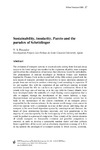Please use this identifier to cite or link to this item:
https://accedacris.ulpgc.es/jspui/handle/10553/74082
| Title: | Sustainability, insularity, pareto and the paradox of Schrödinger | Authors: | Pescador, V. S. | UNESCO Clasification: | 531212 Transportes y comunicaciones | Keywords: | Air Transport System Energy Cost Islands Transport Load Capacity Mass Tourism, et al |
Issue Date: | 2013 | Journal: | WIT Transactions on the Built Environment | Conference: | 19th International Conference on Urban Transport and the Environment, UT 2013 | Abstract: | The evolution of transport systems in recent decades arising from fast and cheap access to the fossil energy has resulted in the expansion of public mass transport and therefore the colonization of territories that otherwise would be unthinkable. The phenomenon of tourism developed in Northern France and Southern England by Thomas Cook in the second half of the 20th century joined with the new means of transport, provided the possibility to move enormous amounts of people from one territory to another, colonizing it and extending its capacities. If we put together this with the expansion of sun and beach tourism in island territories around the 60s we can have an explosive combination. Most of the islands with large rates of tourism, as is the case with the Canary Islands, have been developed under the umbrella of a high floating tourist population that is able to support, through the development of the tourist industry, a huge, disproportionate and growing local population. This economic system has its basis in the maintenance of the current conditions of air transport prices, responsible for the tourism industry. In the current world energy crisis concert in which we operate with a continuous increase in fuel prices, and being that air transport is the most fossil dependent system by consumption and distance, the future of these destinations becomes uncertain, and local populations in the majority of cases has spent by far the load capacity of the territory and therefore could be pushed to a process of emigration. Thus, a study of the current situation of islands transport, its foreseeable evolution and possible competitors is essential, in order to develop a sustainable tourism model and thus calibrate future capabilities of the sector and an absolutely dependent economy of it. It is in my opinion the paradigm of a transport system in which society, economy, and territory depends on the confluence of all three, not only represents the basis of the sustainability, but in this case ends up with an imperative need for subsistence. | URI: | https://accedacris.ulpgc.es/handle/10553/74082 | ISBN: | 9781845647162 | ISSN: | 1743-3509 | DOI: | 10.2495/UT130031 | Source: | WIT Transactions on the Built Environment [ISSN 1743-3509], v. 130, p. 27-37, (Mayo 2013) |
| Appears in Collections: | Actas de congresos |
SCOPUSTM
Citations
1
checked on Jun 8, 2025
Page view(s)
50
checked on Jan 10, 2026
Download(s)
52
checked on Jan 10, 2026
Google ScholarTM
Check
Altmetric
Share
Export metadata
Items in accedaCRIS are protected by copyright, with all rights reserved, unless otherwise indicated.
